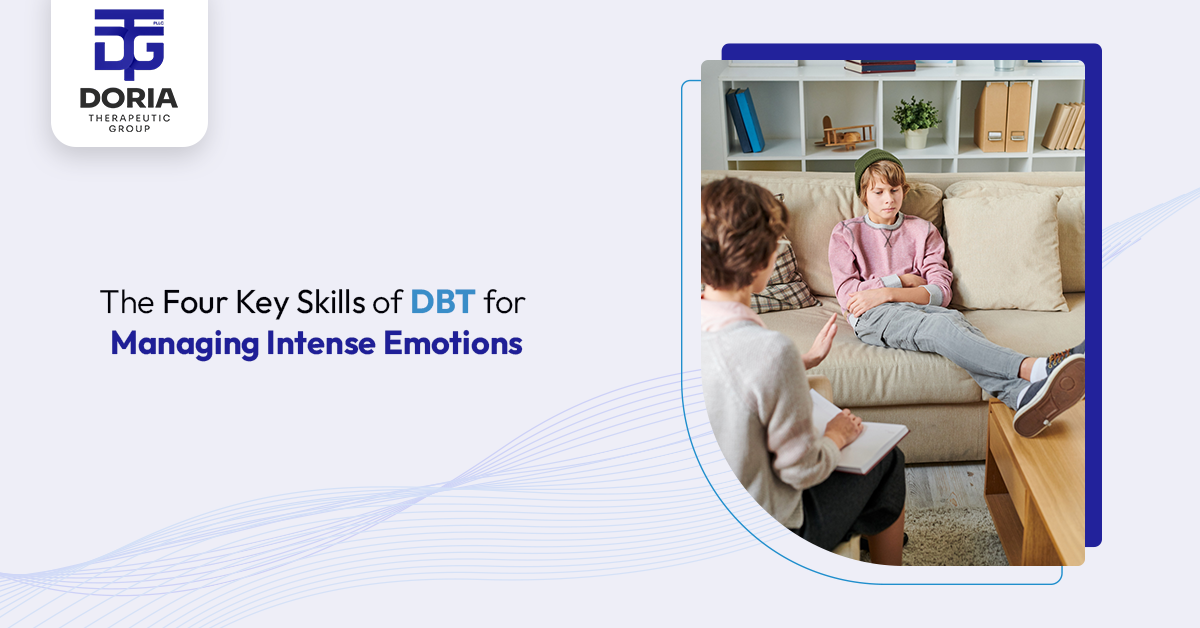Everyone experiences feelings of being overwhelmed by strong emotions, like anger or sadness, at some point.
Dialectical Behavior Therapy (DBT) is a set of skills that can assist you in dealing with these challenging emotions to some degree, like being imbued with superpowers over your emotions!
At Doria Therapeutic Group, we offer evidence-based treatments, such as Dialectical Behavior Therapy (DBT), to help people, couples, and families manage their emotions.
Now, we’ll explore the four key skills of DBT that can make a real difference.
What Are DBT Skills and Why Do They Help?
Dialectical Behavior Therapy (DBT) was created by Dr. Marsha Linehan. It helps people manage strong emotions in healthy ways.
At Doria Therapeutic Group, we use DBT to help our clients not only become symptom-free but also transform their emotional states permanently.
DBT skills help people understand and manage their emotions. They reduce emotional pain over time. They help you respond instead of just reacting. Our DBT-trained therapists will guide you through each phase.
Who Can Benefit from DBT?
If you:
- Feel overwhelmed easily
- React quickly with anger or tears
- Struggling to calm down after a tough moment
- Have unstable relationships
Then DBT can be a game changer.
The Four Key Skills of DBT for Managing Intense Emotions
Skill 1: Mindfulness: Your Emotional Anchor
Mindfulness is the first DBT skill. It means paying full attention to the present moment without judging it.
Many of us live in our heads. We think about the past or worry about the future. But we forget to notice the moment we are living in right now.
How mindfulness helps:
When fear or anger hits, mindfulness stops you from getting swept away.
Example:
When you feel anxious, notice 5 things you see, 4 things you touch, 3 sounds, 2 smells, 1 taste. This “grounding” trick helps during panic.
Try this tip:
Practice a “one-minute check-in” where you pause and focus on your breathing or how your body feels, just for 60 seconds.
At Doria, we integrate Mindfulness-Based Stress Reduction (MBSR) into your DBT journey to enhance awareness and inner peace.
Skill 2: Distress Tolerance: Riding the Wave
Life gets challenging from time to time, and unendurable. Maybe you’ve disputed, gone through a loss, or you just feel emotionally naked. Distress tolerance skills are your survival kit.
These tools help you ride the emotional wave without doing anything harmful or reactive.
At Doria Therapeutic Group, we guide clients in finding healthy ways to pause and cope when life feels too intense.
Try these skills:
- Holding ice
- Splashing cold water
- Counting backward
- Repeating calming phrases (“This will pass.”)
Keep it in mind, there is no stress to repair what you feel immediately. Only get through it.
Skill 3: Emotion Regulation: Understand and Manage Feelings
Emotions are messengers, but they can be too loud at times. Emotion regulation allows you to understand your feelings better. It helps you react in ways that promote well-being. This DBT skill is great for those who struggle with extreme emotional ups and downs.
At Doria Therapeutic Group, we assist clients in examining their emotional patterns. We also provide tools to help them stay balanced.
What it helps you do:
- Understand where emotions come from
- Respond instead of reacting
- Make choices that reflect your true values
Try this approach:
- Name your feeling
- Ask why you feel that way
- Plan what to do to make it better
Eating well, sleeping enough, and moving your body make managing intense emotions way easier!
At Doria Therapeutic Group, we often pair DBT with Cognitive Behavioral Therapy (CBT) to reinforce these skills and reshape unhelpful thought patterns.
Skill 4: Interpersonal Effectiveness: Communicate with Confidence
Relationships often trigger emotional pain. Interpersonal effectiveness guides you through relationships without embarrassment or disrespect, whether you are saying or asking.
Use the DBT “GIVE” skills:
- Gentle: Stay calm and kind
- Interested: Listen without interrupting
- Validate: Acknowledge their feelings
- Easy manner: Keep your tone relaxed
Real example:
Instead of yelling when a friend cancels plans, you say:
“I feel disappointed when our plans change often. Can we talk about what’s going on?”
At Doria Therapeutic Group, in therapy, we practice these conversations so you’re ready to use them in the real world, especially in couples or family therapy sessions.
Putting It All Together: How DBT Changes Lives at Doria
Just suppose you receive some bad news in a way you never expected. Your chest becomes tight, your mind races, and you have the urge to cry.
Here’s how DBT, presented with care by our proficient clinicians, can support you at that time:
- You use mindfulness to pause and breathe.
- You apply distress tolerance to ride out the surge of emotions.
- You lean into emotion regulation to name and soothe your feelings.
- You use interpersonal effectiveness to talk calmly with someone you trust.
At Doria Therapeutic Group, these skills are customized to your narrative and emotional requirements so that you may never feel alone in the process of healing.
Final Thoughts
Learn the four key skills of DBT by starting small. Choose one skill that you will try during this week, and be proud of the little victories. It is about taking good control of strong feelings.
There is nothing wrong with asking for help in case your emotions are too big or out of control.
Learning these skills in more detail can be accomplished with the assistance of a therapist, counselor, support group, and so forth.
Ready to start your DBT journey?
At Doria Therapeutic Group, PLLC, we believe emotional health is a right, not a luxury. Whether you face loss, trauma, or relationship issues, our DBT services can help you find hope and healing. Take your first step today. Call us or make an online appointment now.
FAQs
Q: What if DBT doesn’t work for me?
Not every tool works the same for everyone. Try different approaches and find a therapist who matches your style. Sometimes, it takes time.
Q: Is DBT only for people with mental health diagnoses?
Not at all! Anyone struggling with emotions, relationships, or impulsivity can benefit.
Q: How long does it take to see results from DBT?
It takes weeks or months to see results from DBT. It’s a process that takes time.




